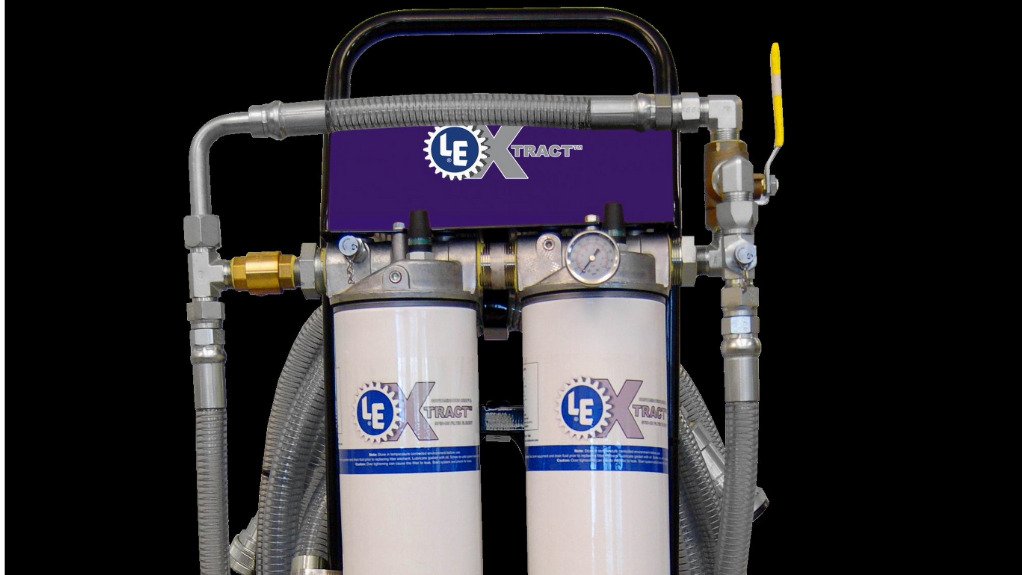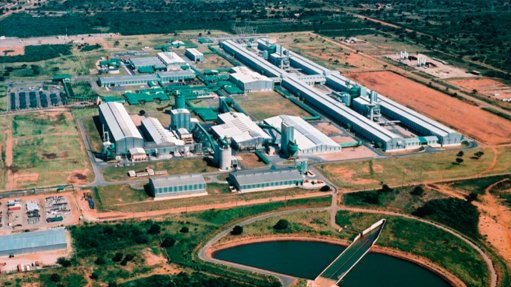Filter cart proposed for lubricant contaminant removal


STAYING IN THE LOOP The kidney loop filtration cart offers clients a quick and easy way to flush and clean contaminated lubricants from hydraulic or lubrication systems
When a lubricant becomes contaminated and is not dealt with expeditiously, that contaminated lubricant can affect the entire machinery system that it is part of, reports high-performance lubricant manufacturer and distributor Lubrication Engineers South Africa (LESA) national marketing manager Gavin Ford.
This can result in increased costs from downtime and equipment repairs, or worse, having to replace equipment entirely.
Dealing with a contaminated lubricant requires the whole system to be flushed to prevent further damage, meaning that for effective filtration, the right tools are essential, he notes.
Therefore, LESA recommends a kidney-loop filtration cart to treat contaminated lubricants in systems.
Kidney-loop filtration systems are primarily used in machinery with hydraulic or lubrication systems, such as industrial machinery and heavy mobile equipment.
Different sizes of filters are available, depending on the system, from 3 µ for hydraulic systems to 20 µ for engines or gearboxes, to avoid filtering out the beneficial additives in the lubricants used in these systems.
A filtration cart is often the first step when LESA is helping a client to resolve such issues.
“We will get complaints of machinery issues like loud operating volumes, high temperatures or excessive vibrations,” he says, adding that from past experience, LESA knows that most of these issues are linked to contaminated lubricants.
About 80% of the time, Ford says the oil needs to be cleaned, rather than replaced.
Whole System Approach
The kidney loop system mechanically separates out any particles or water from the system, which helps to prevent further damage to machinery.
Once the system has been decontaminated, Ford says it is then important to diagnose the issue of the contamination.
In this regard, he says contaminants can get introduced with the introduction of a newly installed part, like a pump or motor not having a breather installed with it, or water getting into the system during cleaning procedures.
“Once we have filtered the lubricant, diagnosed the problem and fixed it, we run the machinery and then do another analysis to check that everything has been sorted out,” says Ford.
In addition to decontamination, filtration carts can be used in a variety of applications such as dispensing or pre-filtering new oil, evacuating used oil, flushing new or repaired systems, collecting samples for oil analysis and topping off reservoirs.
The LESA kidney loop system is designed for filtering mineral-based industrial oils and most synthetic oils with a maximum operating viscosity range of ISO 680 at 38 °C (3 000 ssu/648 cSt), within ambient temperature ranges of -26 °C to 66 °C.
Although filter carts were designed for system decontamination, Ford says that they can also be a good method to cleanly dispense and transfer new oil to machinery or other transfer containers.
In addition, if a reservoir is appropriately equipped, oil additions or oil changes can be done without ever exposing the sump to atmospheric contamination.
Any sealed component that is lubricated should be flushed before or soon after startup, except for hydraulic systems, he says.
In fact, Ford says offline filtration can be much more effective at eliminating run-in debris than changing the oil at the first scheduled interval.
A tool like a filtration cart is an important component in solving lubrication issues, but Ford says these issues can also be mitigated through activities like regular oil analysis, using the correct lubricant for each application, and applying high quality lubricants that are designed to prevent contamination.
Article Enquiry
Email Article
Save Article
Feedback
To advertise email advertising@creamermedia.co.za or click here
Press Office
Announcements
What's On
Subscribe to improve your user experience...
Option 1 (equivalent of R125 a month):
Receive a weekly copy of Creamer Media's Engineering News & Mining Weekly magazine
(print copy for those in South Africa and e-magazine for those outside of South Africa)
Receive daily email newsletters
Access to full search results
Access archive of magazine back copies
Access to Projects in Progress
Access to ONE Research Report of your choice in PDF format
Option 2 (equivalent of R375 a month):
All benefits from Option 1
PLUS
Access to Creamer Media's Research Channel Africa for ALL Research Reports, in PDF format, on various industrial and mining sectors
including Electricity; Water; Energy Transition; Hydrogen; Roads, Rail and Ports; Coal; Gold; Platinum; Battery Metals; etc.
Already a subscriber?
Forgotten your password?
Receive weekly copy of Creamer Media's Engineering News & Mining Weekly magazine (print copy for those in South Africa and e-magazine for those outside of South Africa)
➕
Recieve daily email newsletters
➕
Access to full search results
➕
Access archive of magazine back copies
➕
Access to Projects in Progress
➕
Access to ONE Research Report of your choice in PDF format
RESEARCH CHANNEL AFRICA
R4500 (equivalent of R375 a month)
SUBSCRIBEAll benefits from Option 1
➕
Access to Creamer Media's Research Channel Africa for ALL Research Reports on various industrial and mining sectors, in PDF format, including on:
Electricity
➕
Water
➕
Energy Transition
➕
Hydrogen
➕
Roads, Rail and Ports
➕
Coal
➕
Gold
➕
Platinum
➕
Battery Metals
➕
etc.
Receive all benefits from Option 1 or Option 2 delivered to numerous people at your company
➕
Multiple User names and Passwords for simultaneous log-ins
➕
Intranet integration access to all in your organisation



















